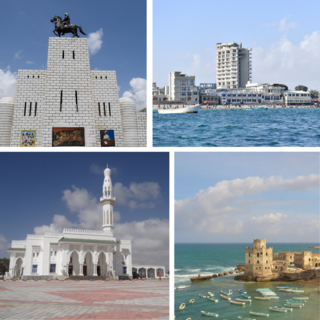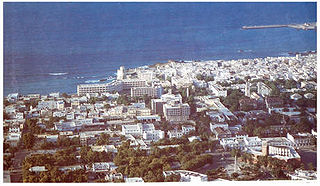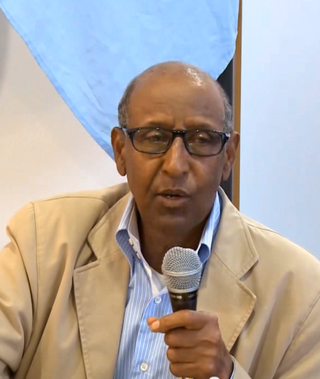| Cinema of Somalia |
|---|
  |
| List of Somali films |
| Somali Film Agency |
| Somaliwood |
The Somali Film Agency (SFA) was a film regulatory body based in Mogadishu, Somalia.
| Cinema of Somalia |
|---|
  |
| List of Somali films |
| Somali Film Agency |
| Somaliwood |
The Somali Film Agency (SFA) was a film regulatory body based in Mogadishu, Somalia.
Following a bloodless military coup d'état in 1969, the production, distribution and importation of films in the country were nationalized by the new-established Supreme Revolutionary Council. [1] [2] Privately owned movie theaters were subsequently replaced with government-controlled film houses, [1] and about 500 films were projected annually. [2]
The Somali Film Agency (SFA) was established in 1975 as an adjunct to the federal Ministry of Information and National Guidance, [3] growing out of the Ministry's visual aids arm. [4] The SFA's duties included overseeing the importation, distribution and censorship of movies in the country. It later also oversaw the production of both long and short films. [2] [5] [6] Most of the imported films were brought in from Egypt, Italy, the Soviet Union and East Germany. To facilitate processing and post-production, the SFA also forged a working partnership with British Films LTD, a British movie company. [1]
Between 1979 and 1983, the Somali filmmaker Ali Said Hassan served as a representative of the Somali Film Agency in Rome. The Somali Film Agency also annually organized the Mogadishu Pan-African and Arab Film Symposium (Mogpaafis) in Mogadishu. The film festival brought together an array of prominent filmmakers and movie experts from across the globe, including other parts of Northeast Africa and the Arab world, as well as Asia and Europe.

Somalia, officially the Federal Republic of Somalia, is a country in the Horn of Africa. The country is bordered by Ethiopia to the west, Djibouti to the northwest, the Gulf of Aden to the north, the Indian Ocean to the east, and Kenya to the southwest. Somalia has the longest coastline on Africa's mainland. Its terrain consists mainly of plateaus, plains, and highlands. Hot conditions prevail year-round, with periodic monsoon winds and irregular rainfall. Somalia has an estimated population of around 17.1 million, of which over 2 million live in the capital and largest city Mogadishu, and has been described as Africa's most culturally homogeneous country. Around 85% of its residents are ethnic Somalis, who have historically inhabited the country's north. Ethnic minorities are largely concentrated in the south. The official languages of Somalia are Somali and Arabic. Most people in the country are Muslims, the majority of them Sunni.

Mogadishu (, also ; Somali: Muqdisho, Wadaad: مُقْدِشو [mʉq'dɪ:ʃɔ] or Xamar, Wadaad: حَمَرْ [ħɑmɑr]; Arabic: مقديشو, locally known as Xamar or Hamar, is the capital and most populous city of Somalia. The city has served as an important port connecting traders across the Indian Ocean for millennia, and has an estimated urban population of 4,249,083. Mogadishu is located in the coastal Banadir region on the Indian Ocean, which unlike other Somali regions, is considered a municipality rather than a maamul goboleed.

Black Hawk Down is a 2001 war film directed and produced by Ridley Scott, and co-produced by Jerry Bruckheimer, from a screenplay by Ken Nolan. It is based on the 1999 non-fiction book of the same name by journalist Mark Bowden, about the U.S. military's 1993 raid in Mogadishu and a Black Hawk helicopter that went down in enemy territory. The film features a large ensemble cast, including Josh Hartnett, Ewan McGregor, Eric Bana, Tom Sizemore, William Fichtner, Jason Isaacs, Sam Shepard, Jeremy Piven, Ioan Gruffudd, Ewen Bremner, Hugh Dancy, and Tom Hardy in his first film role. Orlando Bloom, Ty Burrell, and Nikolaj Coster-Waldau also have minor roles.

The Arab world, formally the Arab homeland, also known as the Arab nation, the Arabsphere, or the Arab states, refers to a vast group of countries, mainly located in Western Asia and Northern Africa. While the majority of people in Arab world are ethnically Arab, there are also significant populations of other ethnic groups such as Berbers, Kurds, Somalis and Nubians, among other groups. Arabic language, which is used as the lingua franca throughout the Arab world.

The Fakr Ad-Din Mosque, also known as Masjid Fakhr Ad-Din, is the second oldest mosque in Somalia after Masjid al-Qiblatayn (Somalia). It is located in Hamar Weyne mogadishu, the oldest part of the city. It is believed to be the 7th oldest mosque in Africa.

Middle Eastern Cinema collectively refers to the film industries of Western Asia and part of North Africa. By definition, it encompasses the film industries of Egypt, Iran, Bahrain, Iraq, Israel, Jordan, Kuwait, Lebanon, Palestine, Oman, Qatar, Saudi Arabia, Syria, United Arab Emirates, and Yemen. As such, the film industries of these countries are also part of the cinema of Asia, or in the case of Egypt, Africa.

The cinema of Somalia refers to the film industry in Somalia. The earliest forms of public film display in the country were Italian newsreels of key events during the colonial period. In 1937 the film Sentinels of Bronze was produced in Ogaden Somalia, with nearly all Somali actors. Growing out of the Somali people's rich storytelling tradition, the first few feature-length Somali films and cinematic festivals emerged in the early 1960s, immediately after independence. Following the creation of the Somali Film Agency (SFA) regulatory body in 1975, the local film scene began to expand rapidly. In the 1970s and early 1980s, popular musicals known as riwaayado were the main driving force behind the Somali movie industry. Epic and period films as well as international co-productions followed suit, facilitated by the proliferation of video technology and national television networks. In the 1990s and 2000s, a new wave of more entertainment-oriented movies emerged. Referred to as Somaliwood, this upstart, youth-based cinematic movement has energized the Somali film industry and in the process introduced innovative storylines, marketing strategies and production techniques.

Arab cinema or Arabic cinema refers to the film industry of the Arab world which depends for most of its production on the Egyptian cinema.

Mogadishu is the largest city in Somalia and the nation's capital. Located in the coastal Benadir region on the Indian Ocean, the city has served as an important port for centuries.
Somaliwood is an informal name for the Somali film industry that has developed in Columbus, Ohio, where a large Somali diaspora exists. Following the model of Bollywood, the name is a portmanteau of the words "Somali" and "Hollywood", the center of the American film industry.

Osman Yusuf Kenadid was a Somali poet, writer, teacher and ruler. Born in Ceel Huur in 1889, he went on to create the Osmanya alphabet for writing Somali. He died on 31 August 1972 in Mogadishu.

Jama Ali Korshel was a Somali army Major General and former Head of the Somali Police Force. He was the Vice President of the Supreme Revolutionary Council.

Somalia–Yemen relations are bilateral relations between Somalia and Yemen. Both members of the Arab League, the two countries formally established diplomatic ties on December 18, 1960.

The Sultanate of Mogadishu, also known as the Kingdom of Magadazo, was a medieval Somali sultanate centered in southern Somalia. It rose as one of the pre-eminent powers in the Horn of Africa under the rule of Fakhr al-Din before becoming part of the powerful and expanding Ajuran Empire in the 13th century. The Mogadishu Sultanate maintained a vast trading network, dominated the regional gold trade, minted its own currency, and left an extensive architectural legacy in present-day southern Somalia.
A growing number of film festivals are held in the Middle East to showcase films from the region as well as international standouts. In addition, institutions and organizations in other parts of the world are increasingly honoring the new generation of filmmakers in the Middle East with Arab film festivals.

Ali Said Hassan is a Somali film producer, director, former photojournalist and archive collector.
The cinema of Libya has had an uneven history. Though there was little local film production in Italian Libya and the Kingdom of Libya, cinema-going became a popular entertainment activity. From 1973 onwards, Muammar Gaddafi tried to exercise control over cinema. Though he encouraged some local filmmaking, his obstruction of foreign film consumption resulted in the closing of cinemas. In the post-2011 instability in Libya, hopes for a resurgence of Libyan cinema combine with a lack of infrastructure.
Cinema of Sudan refers to both the history and present of the making or screening of films in cinemas or film festivals, as well as to the persons involved in this form of audiovisual culture of the Sudan and its history from the late nineteenth century onwards. It began with cinematography during the British colonial presence in 1897 and developed along with advances in film technology during the twentieth century.

A Husband on Vacation also known as A Husband on Holiday is a 1964 Egyptian romantic comedy film starring Salah Zulfikar and Laila Taher. The film is written by Rashad Hegazi and directed by Mohamed Abdel Gawad.